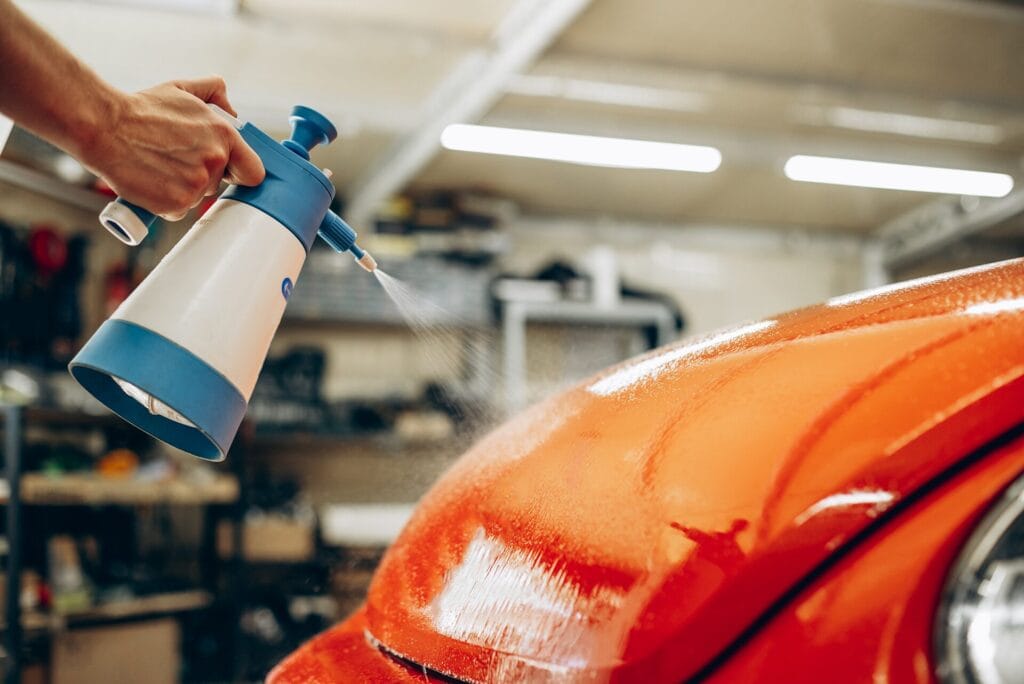Washing your car may seem routine, but the wrong method can destroy your wrap! Discover how to wash a wrapped vehicle the right way to extend its life—whether it’s TPU or vinyl.

What Is a Car Wrap and Why It Needs Care
A car wrap is a film applied to the exterior of a vehicle to change its color, add graphics, or protect the paint. These wraps come in a variety of materials—TPU (thermoplastic polyurethane) and PVC (polyvinyl chloride) being the most common.
While wraps offer stunning aesthetic upgrades and surface protection, they are not indestructible. Without proper care—especially during washing—wraps can fade, peel, or crack prematurely.
Factors That Impact Car Wrap Longevity
A high-quality wrap should last 5–10 years, especially when made from TPU and professionally installed. But longevity depends on multiple external and maintenance factors:
Material Type: TPU vs. PVC
- TPU: Highly durable, self-healing, UV-resistant, and better for long-term use
- PVC: Less durable, prone to shrinkage and cracking over time
Installation Quality
Proper edge sealing and air release help wraps withstand pressure during washing.
Environmental Exposure
- UV rays can degrade color and elasticity
- Road salt, acid rain, and bird droppings can corrode wrap surfaces
- Urban pollutants accelerate aging if not cleaned off regularly
The Connection Between Car Wash and Wrap Lifespan
High-Pressure Washes – Proceed with Caution
High-pressure water can damage wraps if sprayed too close or at wrong angles. Here’s how to use it safely:
- Keep nozzle at least 12 inches away
- Never spray directly on edges or seams
- Use a wide-angle spray head at low to medium pressure
Automatic Car Washes – Mostly a No-Go
Especially brush-style car washes, which use stiff bristles that can:
- Scratch the wrap
- Tear edges or corners
- Remove top coatings
If you must use an automatic car wash, choose touchless systems only, and make sure the water pressure is within safe limits.
Hand Washing – The Best Choice
Step-by-Step for Safe Hand Washing:
- Rinse with water to remove loose dirt
- Use pH-neutral soap with microfiber mitt
- Wash top to bottom gently
- Rinse again with clean water
- Dry with microfiber towel or air dryer
- Avoid circular scrubbing or rough cloths
How Often Should You Wash a Wrapped Car?
The rule of thumb is every 7–10 days depending on usage and environment:
| Condition | Washing Frequency |
| Daily urban driving | Every 7 days |
| Rural or dusty areas | Every 5–7 days |
| Rarely driven vehicles | Every 2–3 weeks |
Immediate spot cleaning is essential for contaminants like:
- Bird droppings
- Tree sap
- Bug splatter
- Fuel residue
Cleaning Products You Should Use (and Avoid)
✅ Recommended:
- pH-neutral car shampoo
- Microfiber wash mitts and drying towels
- Ceramic spray sealants safe for wraps
- Waterless wash for light cleaning
❌ Avoid:
- Solvents, alcohol-based cleaners
- Household detergents
- Abrasive brushes or sponges
- Wax containing petroleum or harsh chemicals
Seasonal Care Tips
Summer
- Wash early or late in the day to avoid water spots
- Use sun-protective sprays to shield against UV damage
Winter
- Rinse off salt immediately after snow/ice driving
- Use warm (not hot) water and avoid frozen edges
Rainy Season
- Remove mud splatter quickly
- Dry completely to avoid watermarks or mildew under edges
Common Mistakes That Shorten Wrap Lifespan
- Neglecting regular washing—dirt embeds into film
- Using high-pressure water on edges—causes peeling
- Over-scrubbing with hard sponges—scratches and thins the surface
- Not drying the car—moisture causes oxidation and stains
- Skipping protective coating—leaves wrap vulnerable
Wrap-Friendly Protection After Washing
To keep wraps looking fresh longer, apply one of these after each wash:
- PPF/wrap-safe ceramic spray
- Hydrophobic topcoat designed for TPU films
- Spray wax (only if film-safe)
These help with:
- Water repellency
- UV blocking
- Easier future cleaning
What the Experts Say: Insights from CARLAS
CARLAS, a leader in color PPF and wrap innovation, recommends:
- Using microfiber only—no sponges or towels with edges
- Always dry the wrap, even after touchless washing
- Apply CARLAS ceramic care spray every 2–3 months
- Never use petrol-based solvents for cleaning stains
Their TPU films are designed for longevity, but only when paired with smart care routines.
FAQs
Q1: Can I use a pressure washer on my wrapped car?
Yes, but keep the nozzle 12–18 inches away and avoid seams.
Q2: Is waxing a wrap okay?
Only with wrap-safe products. Traditional wax may discolor or weaken the film.
Q3: How do I remove bird droppings?
Soak with warm water and microfiber for 1–2 minutes, then gently wipe.
Q4: How long will my wrap last if I wash it properly?
TPU wraps can last up to 10 years; PVC wraps typically last 3–5 years with care.
Q5: Can I use detailing sprays on my wrap?
Yes—choose detailing sprays labeled safe for vinyl or TPU wraps.
Conclusion: Smart Washing = Long-Lasting Wraps
Your car wrap is an investment in both style and surface protection. With regular, careful washing and proper post-wash protection, you can maximize its lifespan, maintain its appearance, and avoid costly repairs or early replacements.
💡 Want a wrap that’s easy to maintain and built to last?
👉 Explore CARLAS TPU Wraps

